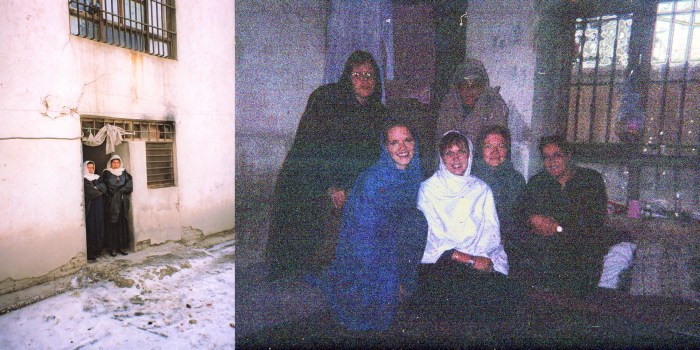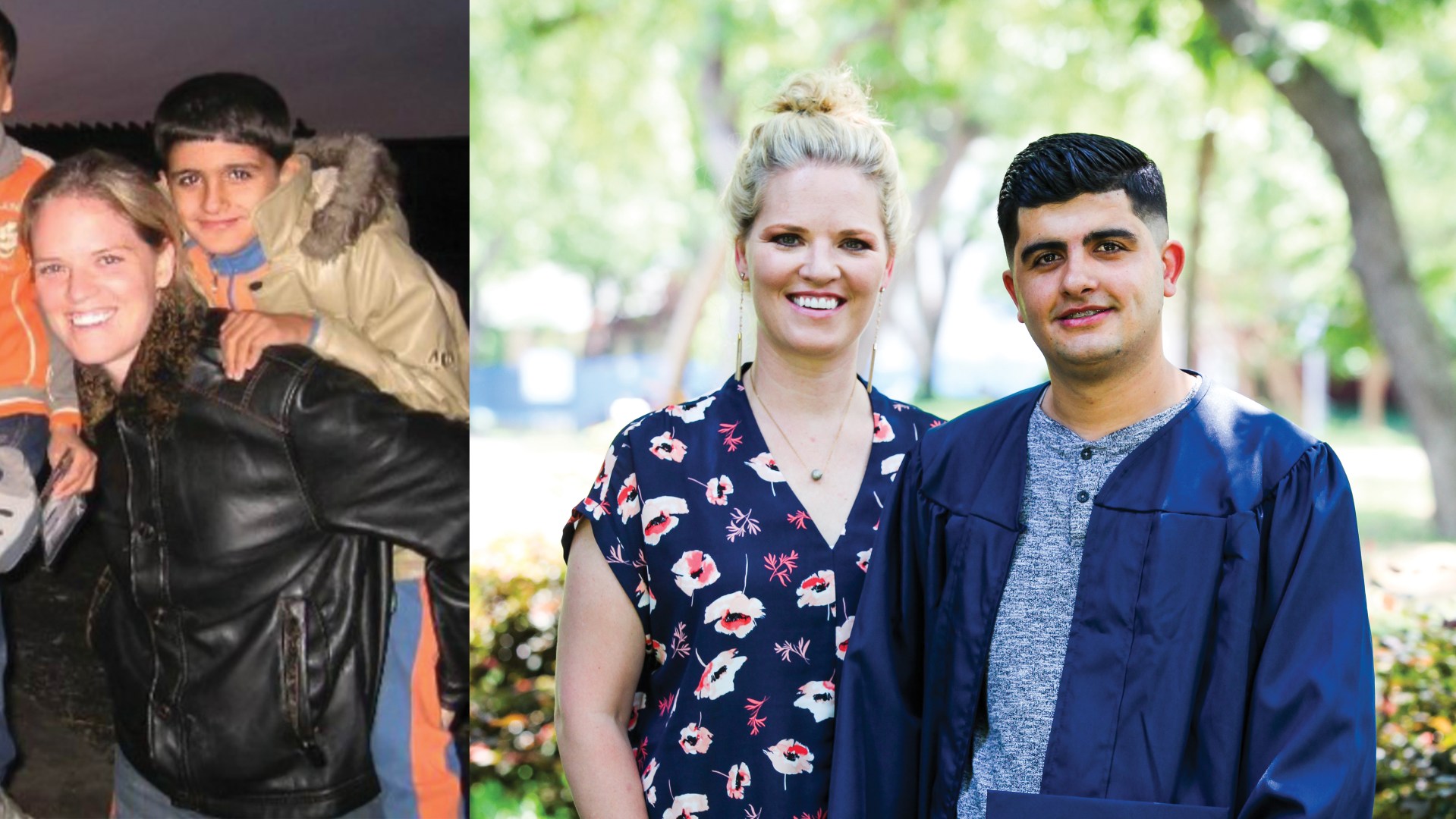When she was 24 years old, Heather Mercer was one of two American women in a group of eight international aid workers and 16 Afghans captured by the Taliban. One month later, a terrorist organization protected by the Taliban launched a successful attack on the United States that shifted the course of history for both nations, and Mercer became briefly famous. She was, for a moment, a kind of icon of the American plight, hostage to this unknown group with unknown aims.
She and the other aid workers were rescued two months later, in November 2001. At the time, Mercer said she hoped her life would be much more than the story of how she was captured by the Taliban. In the past 20 years, she has worked hard to make it more, following her faith in a God who invites us into the work that will change nations and make history.
Now 44, Mercer talked to CT from her office in Kurdistan.
Have you been back to Afghanistan at all since you were rescued?
I have not. I have tried three different times to go back. And one time I got really close to getting my visa, and then the doors closed. I long to go back.
Why do you want to go back? What do you want to do there?
I really want to touch Afghanistan again. I left a piece of my heart there. Afghanistan was my first love. And I want to go back and see the people that were involved, see the Afghans that I knew and loved. There’s one young woman that I was with in prison—I would love to try to find her. All of my memories of Afghanistan are filled only with fondness, gratitude that I got to experience it.
Did you feel that gratitude initially, or is this something that took 20 years of growth and healing? There must have been quite a bit of trauma as well.
I was young when I went to Afghanistan, but I had longed for years to go. I bought a one-way ticket. I told my parents, if I die in Afghanistan, bury me there because that’s the land I love. Even though it ended abruptly, I never felt anger or bitterness towards the Taliban or towards the people. There were things I had to work through coming home. But I never for a day regretted or wished I hadn’t been afforded that experience. From the beginning I knew there was privilege in the opportunity God gave me to experience that time in Afghan history.
 Photos Courtesy of Heather Mercer
Photos Courtesy of Heather MercerYou said in an interview that you didn’t want your captivity story to be the only story of your life. So, after 20 years, what are the stories now that are important to you?
One major story has been the work here in Kurdistan and the Freedom Center. We have our big grand opening of the Freedom Center in September. That’s the combination of 18 years of work and faith and trust in God to do the impossible. We’re now standing on the top of that big mountain climb. It’s an amazing story of God’s faithfulness. It’s the first time in the history of Iraq that something like this has been done.
Everything that we do at the Freedom Center is related to enhancing people’s ability to live free, whether that’s physically free in their society or spiritually free in their hearts, and then bringing in tools and resources to give them hope in chaos and conflict.
We’re really excited about it, really proud of that victory because of what it represents to a generation of people.
When President George W. Bush made the decision for special forces to come in and get us—and in the years since—I’ve realized just how significant and extraordinary it is that I was still alive. I know President Bush often references the Scripture “To whom much has been given, much will be required” (Luke 12:48, NRSV). And I very much feel that same way.
I think one of my other stories would be that I adopted a deaf young Kurdish man. His story is the things that movies are made of. Would you like me to tell you a little bit about him?
Yes, absolutely.
His name is Hawal. In Kurdish it means, essentially, “good news.”
He’s one of eight children from a very amazing Kurdish family. The parents spent the first months of their marriage in the mountains running from Saddam Hussein.
His mother—I would call her a community builder. She’s never been formally educated, but she’s a woman of influence in her community, has a heart to take in the world. Through her own relentlessness, she became my best friend. Three of her children were born with special needs, and one of them passed away.
Whenever I would come to town, Hawal would see my red Jeep come into town, and he would literally run across town to come meet up with me and our team. Because he was born deaf, he never learned to speak. He wasn’t able to go to school. And so, he literally grew up language-less. No reading, writing, speaking, signing. He made up his own language of about 50 gestures.
I was part of this family for years watching him grow up. And then ISIS happens. He’s in his teenage years, and he knows there’s no future for him in Iraq. In an act of desperation he tries to run away, and he insists that he’s going to flee to Europe. His mom is very worried about him, and she confides in me.
We had taken on some big medical projects, so I thought, let’s see if we can get Hawal to America to have surgery. I knew nothing about being deaf. I thought if he has surgery, then he’ll be able to hear and then he’ll speak. Miraculously, we were able to secure a visa for Hawal to come to the US for medical care. And I thought, maybe for six months to a year I was going to coordinate and facilitate his time in the US. While we’re on the way to the airport—April 6, 2016—his mom says to me, “He’s no longer our son. He’s now your son, and we give him to you. And whatever you think is best for his future, he’s your son.” I thought that was just like their Kurdish hospitality saying, “We trust you.” But I learned later after he was in the States that, in fact, they meant it.
As we were flying to the US, Hawal sees the [TV] screen, and he noticed the flight map. And he gestures to me, “Why is the plane going like this [curved] and not like this [straight]?” That was my first clue how complex a story we were about to enter into, because Hawal didn’t know the world was round.
I enrolled him in the Texas School for the Deaf in Austin, which is a residential school. Essentially Hawal had to learn three languages simultaneously without ever having a language construct in his development. And he started to have to learn math from zero. He’s having to learn all of this simultaneously, a million miles away from his country and family of origin.
I had to learn sign language to be able to start even having a way to teach him anything. It was an incredible journey of trial and error, trying to figure out what was going to work. He far surpassed anything that I could give him. And the Lord built this amazing team, not less than 100 people, including extraordinary mentors and friends, who all took a role in Hawal’s life.
Hawal graduated from the Texas School for the Deaf in 2018, was granted asylum, and will soon be getting his green card. And in August, he’ll go to Gallaudet University. He’ll be the first person in his family ever to go to college. He’s built this huge community, a lot of them refugees who have similar stories.
How do you think you’ve changed in the past 20 years?
I feel like I understand how this part of the world works a whole lot more. The whole idea of calling and living for Jesus and walking with God—all of that I feel like I understand a whole lot less.
In my spiritual upbringing, I always had this idea of what it was going to look like to go change the world for Jesus. And I think I was off base in a lot of ways and arrogant. Living in conflict zones has really humbled me. I realize I’m one person in this great big story of God and his heart to fulfill Isaiah 61. I want to be faithful, and I want to run my race well. That’s what I focus on.
I do still believe that God is inviting us in to a work that will make history, but I just want to love him, love people, and be fearless in the mission of freedom in places that have yet to experience it. I wake up every morning and still say, “God, I want to see nations change.” And I trust that he will write that story.












